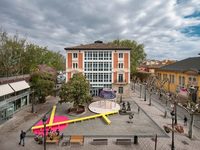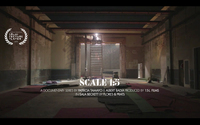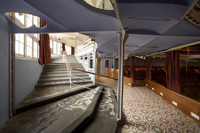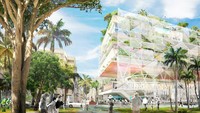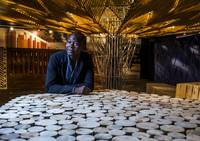Brink Tower
Amsterdam, Netherlands
A ‘Brink’ is an old Dutch word for a green open space where people meet. Bringing people together to live together in a healthy, plant-filled, and sustainable project is also at the heart of the Brink Tower. The location is in the north of Amsterdam, an area that is separated from the rest of the city by the waters of the IJ.
The Brink Tower lies at the edge of the neighbourhood of Overhoeks, which has seen many new residential developments. Just across a canal lies the low-rise Van der Pek neighbourhood. The Brink Tower forms a connecting link between both neighbourhoods, both visually and socially.
The 28-storey tower accommodates a mixed program with a commercial plinth, social housing and much desired medium-priced rental housing including 406 apartments of which 266 rental homes in the middle segment, 120 at affordable rent, a residential care facility, built-in community facilities, a community centre and commercial facilities such as a bowling and cafe. The lively plinth with catering and local entrepreneurs will become the meeting point of the neighbourhood.The tower is stepped with elegant rounded corners and reaches up to 90 meters high. The side facing Van der Pek neighbourhood has a slender shape with a cascade of green, collective roof terraces and gardens where residents can meet. On the other side, the tower is wider, just like the robust adjacent towers of Overhoeks.
The Brink Tower’s cladding is characterised by warm red brick, referencing the Amsterdam School architecture of the 1920s that characterises Van der Pek. The beautiful brickwork is integrated with concrete bands and detailing in the facades, which frame full-height windows all the way to the top on all sides. The result is a green highrise icon for Overhoeks neighbourhood.
The Brink Tower is designed to become an energy positive residential tower and generates more energy than it consumes, thanks to photovoltaics on terraces and facades, wind and more solar energy harvesting on the top roof, and various energy-saving measures including an aquifer thermal energy storage (ATES) system.
- Architects
- Mecanoo
- Any
- 2025
Projectes relacionats
Revista
-
-
-
-
Un despatx madrileny signa un visionari catalitzador urbà en West Palm Beach
Andrea Pala | 29.11.2018 -
L'arquitectura de Francis Keré en escena en el Museu ICO de Madrid
Andrea Pala | 28.10.2018







